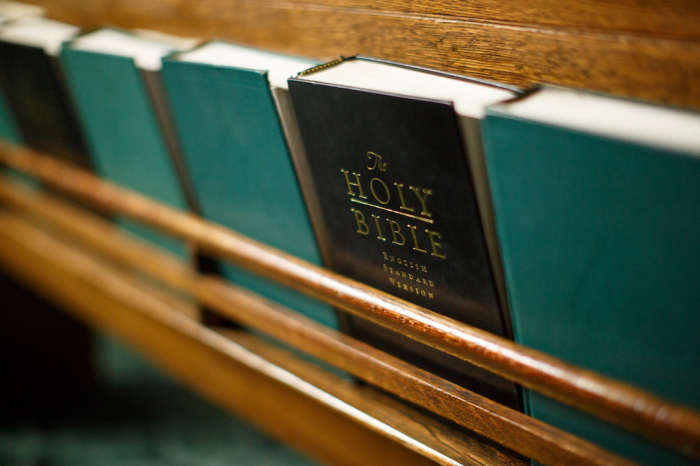Banned Books Week list bans the Bible

This is Banned Book Week. It's sponsored by the American Library Association. As per usual, the world's most banned book, the Bible, does not appear on the list. They should reconsider. ALA's annual crusade against book banning is inconceivable without Ray Bradbury's dystopian novel, Fahrenheit 451, which is the most influential book by far regarding the phenomenon of book banning, and ALA has tapped into the Bradbury brand repeatedly in its public pronouncements.
What they don't seem to know, or at least they ignore, is that Bradbury himself recognized the great importance of the Bible and its historic role as target for banners. Bradbury, who considered himself to be both a Buddhist and a Christian at the same time, gave the Bible a very important role in Fahrenheit 451. For example, the Bible is the first book which Montag reads, the one which awakens him from the strictures of his tyrannical society.
When Montag attempts to free his wife from the spirit of the age, he reads aloud to her from Matthew Arnold's poem, Dover Beach.
"The Sea of Faith
Was once, too, at the full, and round earth’s shore
Lay like the folds of a bright girdle furled.
But now I only hear
Its melancholy, long, withdrawing roar,
Retreating, to the breath
Of the night-wind, down the vast edges drear
And naked shingles of the world….
His appeal seems similar to the narrator of the poem in that he asks his love to join him in faithfulness and truth to one another despite the loss of truth in the world…
"Ah, love, let us be true
Dover Beach
To one another! for the world, which seems
To lie before us like a land of dreams,
So various, so beautiful, so new,
Hath really neither joy, nor love, nor light,
Nor certitude, nor peace, nor help for pain;
And we are here as on a darkling plain
Swept with confused alarms of struggle and flight,
Where ignorant armies clash by night."
"Where ignorant armies clash by night" is especially relevant in that throughout the novel there are glimpses of war planes flying no one knows where and the sounds of distant battle, but no one seems to know who is fighting whom. The clashes are done in ignorance, which Bradbury is telling those who have ears to hear is due to the "long withdrawing roar" of "the sea of faith."
Here’s how much the sea of faith has withdrawn since Fahrenheit 451:
In 1968 a film was made based on the book, except the reference to the Bible as the book which started Montag on his journey, is excised from the story. The famous burning sequence does not show the Bible being burned and has a strong tilt towards post-modern secular literature with a special weakness for existentialism.
In the book, when Montag finally escapes and meets the community which keeps books alive through memorization, he meets someone who has memorized the Gospel of Luke. The film cuts that out too.
It's as though the screen play starts with the book and then tears out (and burns) any of the pages which have anything positive to say about the Bible and the faith.
In 2009, a "graphic novel" is made based on the book. Graphic novels are the artistic sounding names for what we used to call comic books. The book, Ray Bradbury's Fahrenheit 451: The Authorized Adaptation, which the ALA promoted, eliminates almost all of the references to the Bible.
Then we have 2018 and the cinematic reboot of the film which ran on the HBO platform. It went even more off-message, not only does it immolate the message that the Bible is the quintessential ban bait for budding dictators as the 1968 book did, it goes further and aligns the Bible and the burners together. Shockingly instead of the Bible being burned by the "firemen" as in the original novel, the Bible is one of the few books which the state recommends. Admittedly, it recommends a dumbed down emoji Bible, but the book burner in chief early in the film lectures the students about how the Bible and Moby Dick are among the few books worth reading. This is an egregious inversion of Bradbury's novel, worse than burning because it gives the viewer the impression that they are learning something about the story when instead their heads are being filled with lies.
That's HBO, which is Time Warner, which is really AT&T, which should remind us all who the real "firemen" are today. In the US and Europe, it's corporations who are doing the lion's share of the banning. Whether it's literally banning non-approved points of view like trans-skepticism from the digital shelves of Amazon and Target, or Youtube or Twitter, or coopting classic literature in such a way as to reverse its true meaning, the dirty work is increasingly done not by the state but by state-sized corporate entities.
Such banning will fail. It is a sign of fear. I've never banned atheistic books from being read in my household because Marx, Freud and Nietzsche don't scare me. Their ideas are easily demolished through argumentation, so no force is needed. The fact that they ban us shows that force or manipulation is all they have.
Jerry Bowyer is financial economist, president of Bowyer Research, and author of “The Maker Versus the Takers: What Jesus Really Said About Social Justice and Economics.”





























